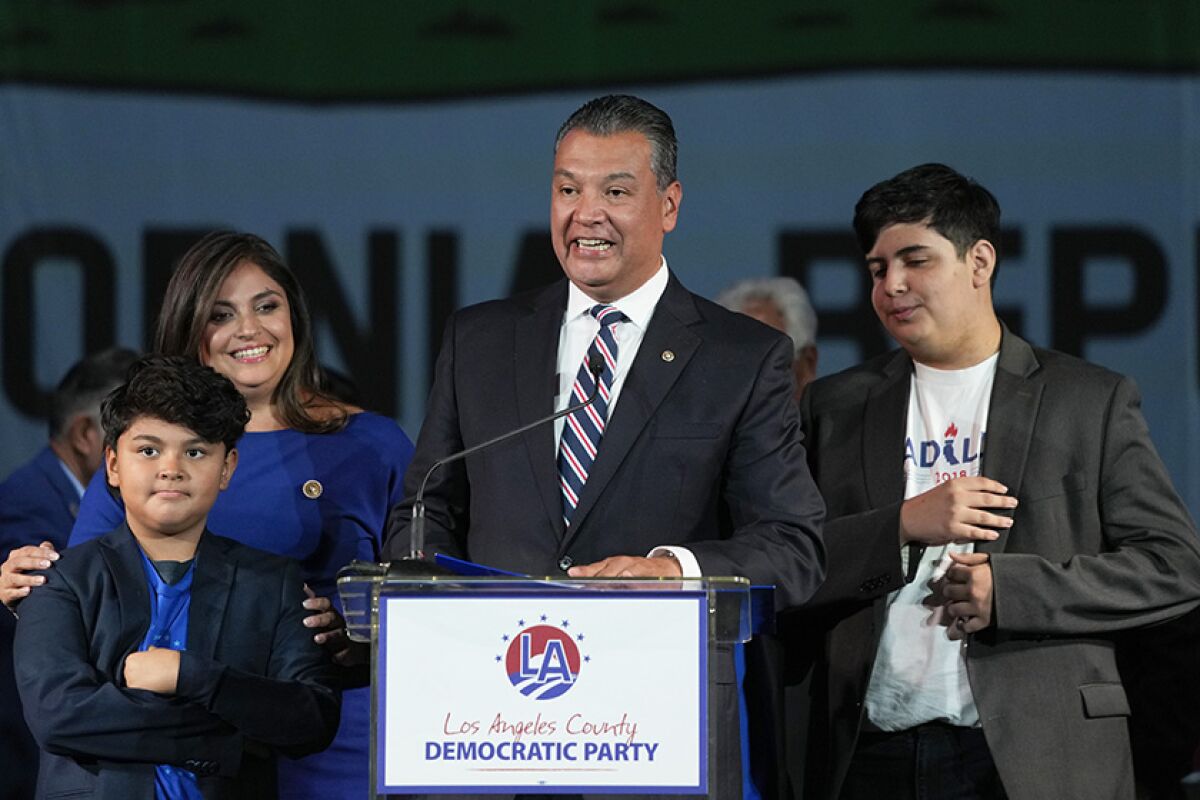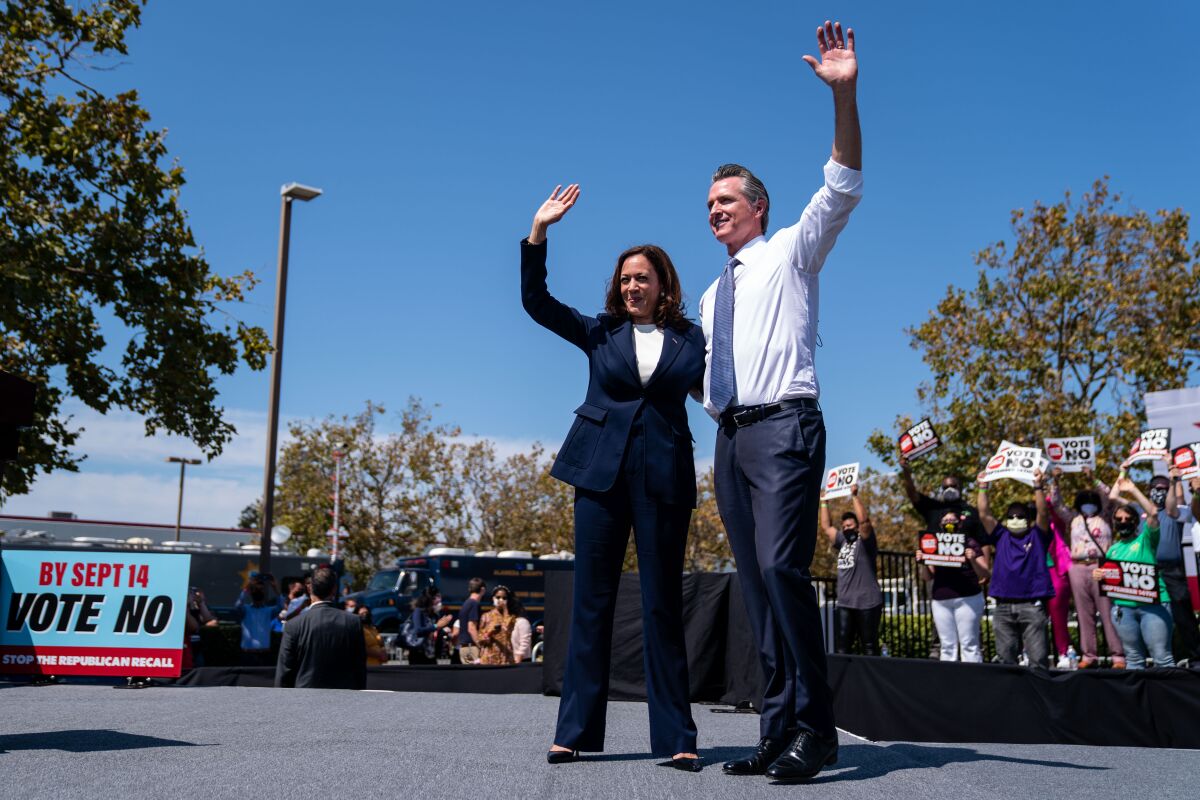On same-sex marriage, ‘the country has caught up with California’

More than 18 years after Gavin Newsom defied federal law by issuing marriage licenses to same-sex couples as San Francisco mayor, President Biden is on the cusp of signing legislation that ensures gay marriages are recognized by the federal government and in every state in the nation.
When he signs the historic bill this week, another Californian will probably be standing beside him: Vice President Kamala Harris, who played a key role in the long fight for marriage equality as state attorney general.
The moment will mark a powerful, if imperfect, validation of early political risk-taking by Newsom and Harris — two of California’s most prominent Democrats, who were at the vanguard of what became an overwhelming shift in how Americans think about civil rights, family and love.
“What this bill signing indicates is that the country has caught up with California,” said Melissa Michelson, a political science professor at Menlo College who specializes in LGBTQ politics. “When California elected officials go out on a limb on these issues, it can be that this is what’s coming for the country, not just because it’s such a big and powerful state, but because we kind of have our finger on the pulse of the future.”
The Respect for Marriage Act is essentially an insurance policy to protect LGBTQ marriage rights if the Supreme Court ever overturned them. It was inspired by the court’s decision this summer reversing nationwide abortion rights.
Even though Justice Samuel A. Alito Jr. wrote for the majority that the decision to overturn Roe vs. Wade “concerns the constitutional right to abortion and no other right,” a concurrence by Justice Clarence Thomas set off alarms that other rights, including contraception and same-sex marriage, could someday also be overturned.
The final version of the bill that Congress sent to Biden requires states to recognize all marriages that were legal where they were performed and protects current same-sex unions if the Supreme Court were to overturn its 2015 decision, Obergefell vs. Hodges.
But the bill offers less protection than Obergefell because it does not require states to let same-sex couples marry. That means if the court overturned the ruling, conservative states could prohibit LGBTQ marriages.
“I don’t think it diminishes the success of the legislation. This was huge,” Sen. Alex Padilla (D-Calif.) said in an interview. “But certainly there’s more work to do in this and other areas where the LGBTQ community continues to face discrimination. We re-committed to the ongoing work, but let’s not lose sight of how significant the Respect for Marriage Act is, especially for same-sex couples in California where it is legal, to know that their marriage will be respected in any and every state in the nation.”
Even with concessions made by Democrats, many conservative groups still opposed the bill, and most Republicans voted against it.

Sen. Alex Padilla (D-Calif.) is joined by his family as he speaks at an election night party in Los Angeles on Nov. 8. “This was huge,” he says of the Respect for Marriage Act.
(Jae C. Hong / Associated Press)
FRC Action, an affiliate of the conservative Family Research Council, called it the “(Dis)Respect for Marriage Act” in an email blast to voters and said it lacks “meaningful religious liberty protections.”
California’s GOP representatives were split on the measure, with five supporting it and six opposing it. Rep. Kevin McCarthy of Bakersfield, who is likely to become House speaker next year when Republicans gain control of the lower chamber, was among those voting no.
Even in liberal California, LGBTQ advocates said their rights feel much more fragile after the overturning of Roe vs. Wade.
“There is a scary and nauseating feeling of constitutional rights quicksand under our feet at the possibility that the Supreme Court ruling on the fundamental right to marry could possibly be eliminated, like the constitutional protection for abortion rights,” said Jennifer Pizer, chief legal officer of Lambda Legal, which advocates for LGBTQ rights.
Terra Russell-Slavin, an attorney and the chief impact officer at the Los Angeles LGBT Center, called the Respect for Marriage Act an “important victory” that will protect same-sex couples when crossing state lines.
But, she said, “it doesn’t go far enough, that’s for sure.”
Having different marriage laws in different states — much like with abortion now — “raises all kinds of issues with access, racial justice, poverty justice, who can afford to leave the state, plus all the expensive challenges that would come with that situation,” she said.
Russell-Slavin’s personal story reflects the topsy-turvy history of marriage equality in California. She met the woman who became her wife shortly after the state’s voters passed Proposition 8 in 2008 to prohibit same-sex unions. They had a marriage ceremony in 2011, but it was not legally recognized. They obtained a registered domestic partnership in 2012, then were finally legally wed in 2013.
That was the year the Supreme Court cleared the way for same-sex marriages to resume in California by ruling that the defenders of Proposition 8 lacked legal standing. As California attorney general, Harris had refused to defend the law, which she believed was unconstitutional.
“I was in my Los Angeles office when the word came through,” Harris wrote in her autobiography, “The Truths We Hold.” “A spontaneous celebration broke out, with whoops and applause ricocheting through the hallways. After so many years of struggle and setback, love had finally conquered all.”
Two days later, Harris wrote, she was in San Francisco City Hall officiating the wedding of two women who had won the lawsuit challenging Proposition 8: “I could feel history being made.”
It was the same City Hall where Newsom had made history nine years earlier by granting marriage licenses to same-sex couples during the week of Valentine’s Day, in violation of federal law.
“At that time, this was seen as an act of protest, just as much as an act of love,” Newsom said in a statement. “While these federal protections are an important step forward, we must continue to fight for true equality in every state across the country to ensure that all marriages, and all people, are recognized and treated equally under the law.”
Deena Davenport-Conway and her wife, Gunner, were among those who rushed to San Francisco City Hall in 2013 to get married after the Proposition 8 ruling. They had tied the knot in an unofficial ceremony in Oakland weeks before.
Now, a decade later, Davenport-Conway feels as though her rights could be taken away.
“My wife and I have a future together. We have a home together. We have a retirement we’re planning together,” said Davenport-Conway, who lives in rural Inyo County and is president of the fledgling Eastern Sierra Pride. “And at the drop of a hat, someone could take that away from us. … If they can overturn Roe vs. Wade, for God’s sake, anything is possible.”

Vice President Kamala Harris, left, and Gov. Gavin Newsroom at a labor rally in 2021. Their actions to advance marriage equality came with risks.
(Kent Nishimura / Los Angeles Times)
For both Newsom and Harris, their actions to advance marriage equality also came with risks. Newsom faced criticism from fellow Democrats for going too far, too fast and was blamed for stoking conservative energy that helped Republican George W. Bush win reelection in 2004.
Harris had pledged not to defend Proposition 8 when she ran for attorney general in 2010 in a tight race against a Republican who argued that the state’s top lawyer shouldn’t pick and choose which laws to defend.
“For each of them, it was one of the defining moments in their early careers,” said Brian Brokaw, a Democratic political consultant who has worked on campaigns for both Newsom and Harris.
The risks paid off as successes that boosted their political profiles and paved the way for a massive cultural shift. Public support for same-sex marriage has risen dramatically in the years since then, with 71% of Americans now in favor.
As support for marriage equality has gone mainstream, LGBTQ advocates have poured energy into other fights for freedom, respect and safety. Efforts to advance transgender rights and stop violent attacks on LGBTQ people are now at the forefront of the movement, said Michelson, the political science professor.
Though Harris and Newsom have proved themselves as leaders who were ahead of their time on the issue of marriage, Michelson said, it’s no guarantee of their political futures. Harris is seen as the front-runner to seek the Democratic presidential nomination if Biden decides not to run again. Though Newsom has said he does not plan to run for president, he is working to boost his national profile.
“As much as this is a very important issue to gay and lesbian people who are in marriages or look forward to being in marriages,” Michelson said, “I doubt that it is the issue that is going to be at the top of people’s minds when it comes to future presidential races.”
Share this news on your Fb,Twitter and Whatsapp
Times News Network:Latest News Headlines
Times News Network||Health||New York||USA News||Technology||World News